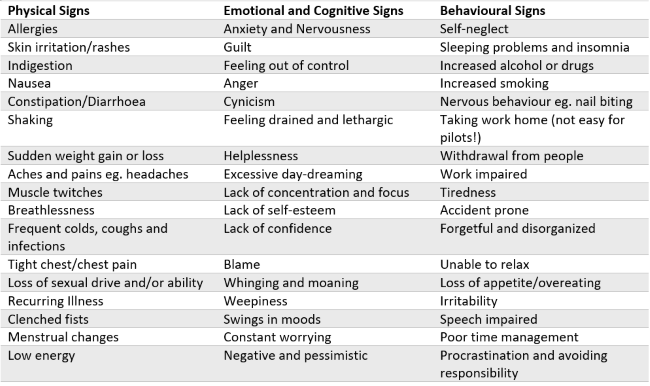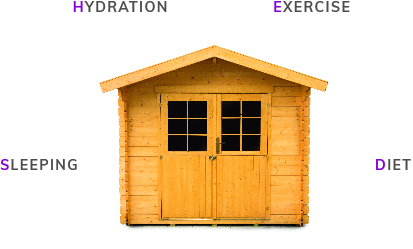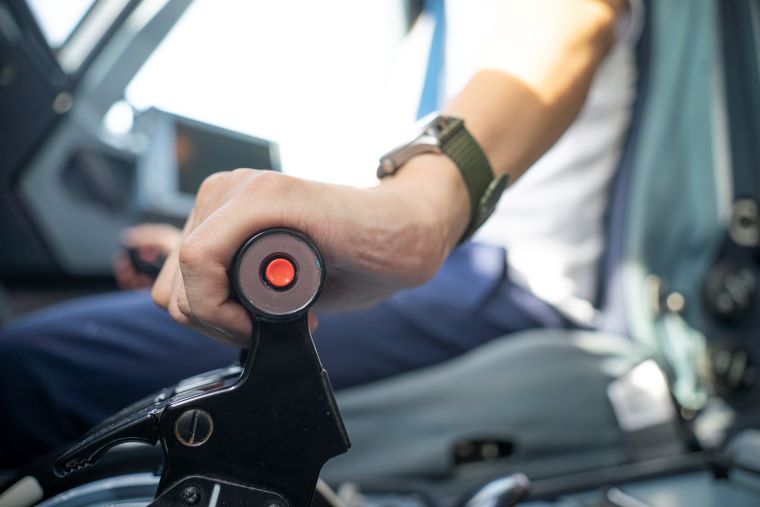Coping with stress – Top hints for pilots

The Good Vs The Bad
Stress is not always negative. Having absolutely no stress at all in our jobs or our lives can lead to boredom and frustration through not using skills that we have developed or by having no chances to learn and develop further. That boredom can then lead to fatigue and laziness, and potentially a lack of attention to detail which can result in mistakes being made. On the other hand, too much stress can give us a feeling of excitement and of living life on the edge, but there is a risk that this can quickly turn to burn-out. We can find ourselves overwhelmed by feelings of anxiety, have so much to cope with that we become disorganized or fail to prioritise work effectively. All resulting in ultimately being unhappy with work and life.
The right amount of stress keeps us thinking, paying attention to what we are doing, it energises us and makes us more effective. It is fair to say that stress should be welcomed in the right amounts.
What are the signs of stress?
There are many signs that we are becoming stressed, no one person will experience them all and individuals will vary as to the balance of those symptoms. The signs can be categorized as Physical, Emotional and Cognitive, and Behavioural and some people will have more physical symptoms, others more emotional or behavioural.
Individuals may not notice the signs themselves, particularly the behavioural ones, and may also become adept at hiding the way they are feeling because of the perceived shame of admitting to not being able to cope. Every day they wake up a little worse than the day before, and the ‘normal’ changes so gradually they and those close to them are not aware. This is like when grandparents who do not see their grandchildren for a few weeks notice how much they have grown or developed, someone seeing a person on a sporadic basis is more likely to notice these changes to a person and recognize they may need help.
The key signs are:

My top tips for coping with stress
Over my years of experience working on the subject of mental health within the aviation industry these are my top tips for coping with stress.
There is plenty of negativity out there – it will hit you in the face without you going looking for it. A positive mental attitude helps you start each day on the right foot, even though that might be easier said than done at times.
Take regular exercise, whether this is walking, cycling, yoga, pilates, whatever you can manage – a healthy mind in a healthy body is an old wives’ tale for a reason, as is mind over matter.
Eat and drink a healthy diet, whether this is vegan, vegetarian, omnivorous – make sure it is balanced, and keep hydrated.
Keep in touch with friends and family, and talk to them rather than keeping things to yourself. And by talk, I don’t mean via social media but person to person, even if this has to be via Skype, Teams, Zoom or some other technology. One of the worst things about Covid is that it is keeping people from getting physical support from their friends and family – a hug goes a long way towards making someone feel better. That is one possible reason for the upsurge in ownership of cats and dogs since the pandemic began, because you get unconditional love and physical comfort from them.
Use wellbeing resources, whatever your preference there are excellent self-help books if you like to read and some really good apps if you like technology.
Check your coping strategies. Our initial reaction to a stressful event is emotional, we can’t help it, it’s driven by adrenalin and cortisol and in an evolutionary context served to keep us alive – driving the chimp brain choice to run away or to throw something at the cause of the alarm. However, emotion is a less-than-helpful response to stress in the modern world, so we need to settle the chimp down and do something more rational. Sometimes this is to put off dealing with the situation till later, we call this avoidance. Avoidance can be helpful, if what we do is go and have a cup of coffee with a friend and seek their advice. It can be unhelpful if we make ourselves feel better about that large credit card bill by indulging in a spot of retail therapy. What we need to do is to deal with the situation. Remember, if the task seems huge, how do you eat an elephant? One bite at a time, so break the problem down into pieces and deal with each in turn.
Practice some relaxation techniques, this can be mindfulness, yoga, whatever works for you. The underlying principle of all these is to stop what you are doing, take some time out and focus on you.
Finally, be kind to yourself, lower your expectations, particularly in the current situation whilst so much is out of our control.
The SHED model of wellbeing
Even if you are too busy to spend time destressing, the four key principles are something we all do every day – we eat, sleep, drink and move around. Simply being more aware of what we do in each of these areas will help with reducing stress – eat a balanced diet, keep hydrated, do some exercise and get enough sleep.

One potential cause of stress could be upcoming pilot aptitude tests, Symbiotics offer practice tests which allow you to familiarise yourself with the testing process and reduce any test anxiety that you may have. Airside members can take advantage of a 20% discount on Symbiotics’ practice pilot aptitude tests.
welcome aboard the new airside
We took our community to the next level with an elevated look, innovative features, and new tools.



